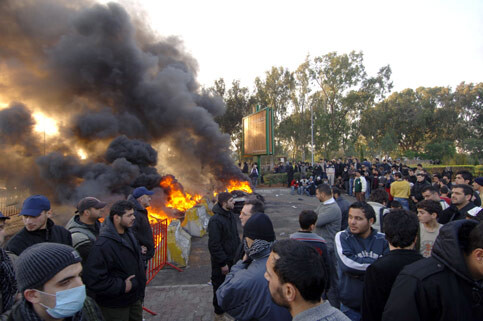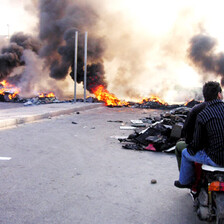Electronic Lebanon 13 February 2007

Clashes between pro-government and anti-government protesters have been heating up in recent weeks. (Dina Debbas/IRIN)
BEIRUT, 13 Feb 2007 (IRIN) - Leaders of the Lebanese pro-government ‘March 14’ group warned that the country was sliding towards Iraq-style sectarian violence after at least three people were killed in explosions that hit two buses travelling through a Christian-majority mountain town outside Beirut.
“This was a new form of terrorism for Lebanon. We are all afraid that it will push Lebanon towards the kind of violence that we see in Iraq,” Michel Khoury, a member of the Christian Phalangist Party and of the March 14 committee, told IRIN.
The bombing came a day ahead of a planned mass rally by the March 14 group to commemorate the second anniversary of the assassination of the former Lebanese Prime Minister Rafik Hariri.
The explosions hit public buses carrying people to work in Beirut from the area around Bikfaya, 24km north-east of the capital. In addition to the fatalities, the blasts also injured 20 people, many of them seriously.
Bikfaya is the home town of Amin Gemayel, former president and head of the Phalangist party, whose son was assassinated by gunmen in November.
Security in the Lebanese capital would be further heightened, said Khoury, in a bid to prevent violent clashes between pro-government demonstrators and members of the Hezbollah-led opposition, which has been camped out for more than three months in central squares of Beirut demanding the resignation of Prime Minister Fuad Siniora’s government.
“This was a terror message aimed at preventing our followers from participating tomorrow,” said Khoury. “But we will not be deterred. Tomorrow is a national day and we hope it will be a peaceful day.”
Tension has been running high in Lebanon since street clashes last month between supporters and opponents of the Western-backed government left nine people dead.
Khoury said he believed the perpetrators of the bombings aimed to disrupt Lebanon’s participation in the international tribunal being set up to try those accused of Hariri’s assassination. Syria was widely blamed for Hariri’s death, a charge Damascus has vehemently denied.
Patrick Haenni, a Beirut-based senior analyst with the International Crisis Group (ICG), told IRIN that the current political crisis should be taken as an opportunity to resolve the disputes between the opposition and pro-government forces over the formation of the Hariri tribunal. The Hezbollah-led opposition has said the government acted illegally in endorsing the draft text of the tribunal after six opposition cabinet ministers resigned.
“All sides seem to be waiting for a solution to the crisis to come from abroad,” said Haenni. “Instead they should be sitting down and discussing the details of the draft document on the formation of the Hariri tribunal.”
“Both sides need to change their approach and see the tribunal not as a way to break Syria, but as a peaceful end to a certain relationship that existed between Syria and Lebanon,” he added.
This item comes to you via IRIN, a UN humanitarian news and information service, but may not necessarily reflect the views of the United Nations or its agencies. All IRIN material may be reposted or reprinted free-of-charge; refer to the copyright page for conditions of use. IRIN is a project of the UN Office for the Coordination of Humanitarian Affairs.
Related Links


